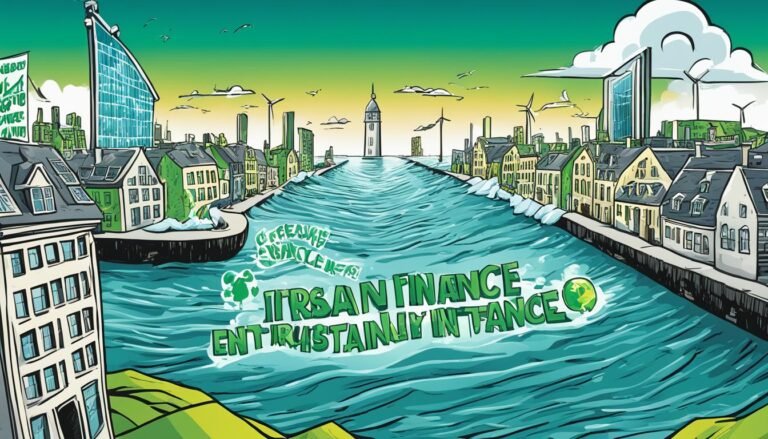Ireland’s Financial Services and International Trade
In 2022, Ireland’s GDP hit over $533 billion, thanks to its strong export focus. This shows how key Ireland’s financial services are to its global finance role. These services and international trade are closely linked, making Ireland a top choice for foreign investment. The country’s favorable rules help with capital flow and keep the economy stable.
Recently, Ireland has changed its financial scene, becoming a key spot for financial firms. After the 2007-2008 crisis, its banking sector grew stronger and more adaptable. Knowing how Ireland’s financial services and international trade work gives us a closer look at its growing economy and role in the Eurozone.
Key Takeaways
- Ireland’s GDP surpassed $533 billion in 2022, highlighting its robust financial services sector.
- The interplay between financial services and international trade significantly enhances foreign investment opportunities.
- Post-crisis reforms in the banking sector have strengthened Ireland’s financial institution’s resilience.
- Ireland enjoys favorable regulations for international trade, including unrestricted foreign investment.
- The financial services industry is crucial for fostering Ireland’s economic relationships with the Eurozone and beyond.
Overview of Ireland’s Financial Services Landscape
Ireland’s financial services have grown a lot over the last 40 years. Now, over 430 financial companies work here, showing a strong growth in the sector. Since 2015, jobs in this field have jumped by 25%, with over 47,000 people now working in various roles.
Important financial centers are not just in Dublin but also in Cork, Galway, and Limerick. These places offer many chances for investors and businesses. They show Ireland’s ability to support many financial activities.
This sector covers banking, fund management, and technology. Its variety shows the financial services sector’s strength. It also points to more companies outsourcing financial services to improve efficiency.
Financial institutions in Ireland are flexible and ready for changes. They handle tasks from compliance to software development. This flexibility is key as the sector keeps growing, meeting needs at home and abroad.
Significance of Financial Services in the Irish Economy
The financial services sector is key to Ireland’s economy. It makes a big economic impact and helps create jobs. By mid-2023, Ireland hit a record high in employment, thanks to the financial sector’s growth.
This sector is a big part of the private sector jobs, making up almost 20%. Many of these jobs come from Foreign Direct Investment (FDI).
The financial services industry also exports about €11 billion a year. This makes it a major exporter. With over 1,600 foreign companies, it employs around 250,000 people directly.
Ireland is the top place for attracting and keeping international talent. This shows how important financial services are for a strong workforce.
IDA Ireland has a strategy for 2021-2024 to grow and transform the financial services sector. It focuses on being sustainable and making a big impact.
The financial sector boosts GDP and tax revenue. It also supports innovative research and lots of business activity. With a strong focus on investment and talent, financial services are crucial to Ireland’s economy.
Global Hub for Financial Institutions
Ireland is a key spot for financial companies, with over 430 firms serving global markets. It’s home to 20 of the world’s top 25 financial institutions and 17 of the top 20 banks. This shows Ireland’s strong financial market strength. The financial sector employs over 42,000 skilled people, supporting EMEA operations and offering deep expertise.
Big names like Citi and Zurich have big operations in Ireland. Citi has 2000 staff mainly in Dublin’s IFSC. Ireland leads in finance, making big contributions to hedge funds and aircraft leasing. In fact, Ireland services over 40% of global hedge fund assets and holds 60% of the aircraft leasing market.
Ireland is the EU’s fourth-biggest exporter of financial services, thanks to its 12.5% corporate tax rate. It has strong regulatory support and tax deals with 76 countries. This makes it a top choice for global financial firms. Ireland’s solid setup for fund and insurance administration keeps it key in the global finance world.
Comparison with Other European Financial Hubs
In the comparison of European financial hubs, Ireland stands out. It’s different from cities like London, Frankfurt, and Paris. London is the second biggest financial center globally, while Dublin ranks 25th. Edinburgh, in the UK, is 34th.
Frankfurt and Paris are 14th and 15th, respectively. Germany has five cities in the top 50, including Frankfurt, Berlin, Munich, Stuttgart, and Hamburg. Switzerland also does well, with Geneva and Zurich at 10th and 18th. The link between a city’s finance and its corruption and economic freedom scores is clear.
Ireland’s financial services performance is impressive, despite its size. It exports more than some bigger places. This is thanks to a good tax system and a pool of highly skilled people. Many big companies have also moved there, making Ireland even stronger.
- Competitive tax regime
- Highly educated workforce
- Attractive business climate
- Strong presence of multinational corporations
These factors make Ireland a key player in the financial world of Europe. It holds its own in discussions with Ireland vs. London, Frankfurt, and Paris.
Ireland’s Financial Services and International Trade
Ireland’s financial services are key in the world of international trade. They offer important banking services and help with global transactions. Ireland’s strong ties with the U.S. help grow trade.
Role of International Trade in Finance
Financial services and international trade greatly benefit Ireland’s economy. In 2022, Ireland made €63.786 million from financial services. The UK and the Euro Area were big markets, with exports of €7.068 million and €6.142 million respectively.
This shows how important international trade is for Ireland’s financial services. It also helps grow the economy and improve relations with other countries.
Impact of Foreign Direct Investment
Foreign investment changes Ireland’s financial scene, bringing new ideas and jobs. U.S. companies are a big part of this, employing over 210,000 people. The U.S. invested $574 billion in Ireland in 2022.
This investment boosts trade and strengthens ties with other countries. It makes Ireland a key player in international trade.
Regulatory Environment and Banking Regulations
The regulatory environment in Ireland is key to keeping the financial sector stable and trustworthy. The Central Bank of Ireland leads with a strong framework for financial oversight. Banking regulations are updated often to support growth and protect the sector’s integrity.
Since November 4, 2014, the European Central Bank has been crucial in supervising big banks in the euro area. This has made rules the same across countries and improved how financial services are watched.
Changes to Solvency II in 2021 show a focus on sustainability. These rules now include sustainability risks in financial checks. The European Insurance and Occupational Pensions Authority also has guidelines for handling climate change in risk assessments.
Rules like the Sustainable Finance Disclosures Regulation and the Taxonomy Regulation set clear standards for investment funds. Since 2022, the Central Bank of Ireland has stepped up checks to make sure these rules are followed. This helps with sustainable investments and getting capital to flow better.
Even with progress, Ireland’s financial sector has faced hurdles. Nationalizing private debts after bank failures hit taxpayers hard and changed how people saw banking stability. Creating the National Asset Management Agency was key to rebuilding trust and helping the sector recover.
In conclusion, ongoing reforms and careful oversight from the Central Bank of Ireland are crucial for Ireland’s financial stability.
FinTech Ecosystem Development
The FinTech scene in Ireland is booming, thanks to new finance technologies and a strong startup culture. Big names like Mastercard and Stripe are pouring money into making financial services better. This has led to more jobs and new tech breakthroughs. It helps *startups in Ireland* grow and challenge old ways of finance.
Emerging Technologies in Finance
New tech like artificial intelligence, blockchain, and cybersecurity is changing finance. Over 80% of banks see AI’s value, and blockchain investments are growing fast. Big names like Citi are jumping into blockchain. This keeps Irish companies competitive in a fast-changing market.
Startups and Innovation in FinTech
Startups in Ireland are leading the charge in changing finance with new ideas. For five straight quarters, over 30 FinTech companies have become unicorns, showing the sector’s growth. Programs like the Digital Hub incubator and Bank of Ireland’s “startlab” help new companies grow.
These programs offer mentorship, resources, and a place to work together. Companies like Revolut, WorkFusion, and Coinbase show what Ireland’s FinTech scene can do. They draw in investors and talent.
Offshore Finance Hub and Tax Benefits
Ireland is a top offshore finance hub, attracting big companies with its low corporate tax rates. Companies pay just 12.5% in taxes, making it a great spot for saving on taxes and tapping into the European market. Ireland also offers financial services incentives to bring in foreign money.
In 2015, Ireland was ranked 37th on the Financial Secrecy Index, with a secrecy score of 40. It made up about two percent of the world’s offshore financial services. By July 2013, Ireland had nearly 14,000 funds, managing €3.7 trillion in assets. This shows how much more trust investors have in Ireland now than a decade ago.
The Irish Stock Exchange is a big player, hosting 25% of international bonds and 50% of European ETF assets. This shows Ireland’s key role in the world’s financial markets. By 2014, the IFSC had a whopping $2.7 trillion in foreign investment, which is 15 times Ireland’s GNP.
Foreign investment in Ireland jumped from 2.2% of GDP in 1990 to 49.2% by 2000. This shows how attractive Ireland is to foreign companies. In fact, 80% of Ireland’s corporation tax comes from U.S. companies, showing their big impact on the economy.
Even though some call Ireland a tax haven, it’s not seen as one by the OECD or EU Commission. Ireland has base erosion and profit shifting (BEPS) tools that let foreign investors keep taxes low, between 0% and 2.5%. This makes Ireland a key offshore finance hub, helping companies grow and trade globally.
Eurozone Trade Agreements and Economic Relations
Ireland’s position in the Eurozone helps it make strong trade deals. These deals give Irish exporters a big advantage in the EU market. This is key to Ireland’s economy.
Irish trade deals with about 70 countries help the EU a lot. Around €3 billion worth of Irish goods get special tariffs now. Deals like the EU-Japan Economic Partnership make trade easier with big partners.
The EU-Canada Comprehensive Economic Trade Agreement (CETA) is a big deal. It shows how well these partnerships can work. The EU is also working with ASEAN and Vietnam, cutting tariffs and improving standards.
Ireland focuses on its financial services sector. Trade deals help make this sector more stable. Deals with New Zealand and South Korea make Ireland’s trading reach wider.
Ireland keeps working with Eurozone countries to improve its trade ties. It has agreements with countries in the Balkans and Africa. This keeps its trade strong and growing.
Overall, Ireland’s trade deals with the Eurozone are key to its economic success. They help Ireland keep its trade policies strong and support its financial services.
Brexit Implications for Ireland’s Financial Sector
The Brexit decision has changed Ireland’s financial sector a lot. It brought new rules and changes to the market. Ireland became a top choice for companies looking for stability and good rules.
The Brexit Adjustment Reserve gave €5.37 billion to help sectors hit by Brexit. Ireland got about 20%, or €1 billion, from this fund. This money helped with big changes in the financial world.
More jobs have come up as financial companies grew in Ireland. The Central Bank of Ireland now watches over about 10,000 firms in finance. New teams were made to handle Brexit’s effects, focusing on getting firms ready in banking, insurance, and investments.
The Temporary Run-Off Regime (TRR) helps UK-insured firms manage their business for a while. It makes sure they can move their operations smoothly. Working with the European Central Bank (ECB) sets clear rules for banks, keeping the market fair.
Even though Brexit has changed the financial sector a lot, it also brought challenges. Irish companies face new VAT rules and rules for hiring people from other countries. These issues show the need for companies to adapt to stay ahead in a changing market.
Global Capital Flows and Cross-Border Transactions
Ireland is a key player in global finance thanks to its strategic location. It offers a wide range of financial services that make it a top spot for foreign investment. Companies worldwide use Ireland’s strong infrastructure for smooth cross-border dealings. This helps them make the most of international finance opportunities.
Ireland’s current account has changed a lot, moving from a big deficit in 2008 to a surplus in 2019. This change shows how Ireland’s economy is becoming more connected to the world. Even though Ireland owes more money abroad than it has locally, its financial services sector helps balance things out.
Most of the activity in cross-border dealings comes from multinational companies. They get a lot of their money from abroad. This shows how important foreign-owned companies are to Ireland’s economy. The International Financial Services Centre also helps keep things stable.
Ireland owes about €600 billion, which is around 185% of its GNI*. But, experts say the country is actually in a balanced position overall. This shows how important it is to understand the flow of money across borders. It helps us see what’s happening with Ireland’s economy and how to keep it stable.
Conclusion
Ireland’s financial services are key to its economy and trade with the world. In 2021, the country’s trade hit over €840 billion, showing how important these sectors are. They help create jobs, supporting about 1.3 million people, and foreign investment shapes Ireland’s future.
Ireland is ready for growth with its strong rules, support for businesses, and growing FinTech scene. The 2022-2026 Trade and Investment Strategy aims to boost sustainable growth and tackle global challenges. The trade with the United States is also crucial, making up over 20% of Irish exports.
As trade changes, Ireland’s approach will be vital. Its plans and values in trade set a good example for sustainable economic ties. Ireland’s strong financial sector will help it face economic challenges, ensuring growth and stability in the EU.
Source Links
- Ireland – Trade Financing
- International Trade in Services 2021
- Ireland – Market Overview
- Ireland: Country File, Economic Risk Analysis | Coface
- Behind the Data | Central Bank of Ireland
- Foreign Direct Investment
- Ireland – United States Department of State
- The economic context of Ireland
- Sectoral Strengths: Finance | Meet in Ireland
- Home Page | IFSC
- Financial services in Dublin
- Ranked: Which cities are Europe’s best financial hubs?
- Financial services
- Economy of the Republic of Ireland
- Index of Economic Freedom: Ireland | The Heritage Foundation
- Ireland – Banking Systems | Privacy Shield
- International Trade in Services 2022
- Financial Regulation and Supervision | Central Bank of Ireland
- gearywp201203.pdf
- Ireland is emerging as a global hub for payments – FinTech Futures: Fintech news
- Ireland's fintech and payments space: The rise of a global hub for innovation and investment
- How Ireland became an offshore financial centre – Tax Justice Network
- Ireland as a tax haven
- Offshore financial centre
- Free Trade Agreements
- EU Trade agreements
- The impact of Brexit on Ireland
- Brexit FAQ – Financial Services Firms
- Brexit’s Impact on Irish Businesses: Consequences and Strategies
- SPU 2016
- Benefits of EU membership for Ireland








